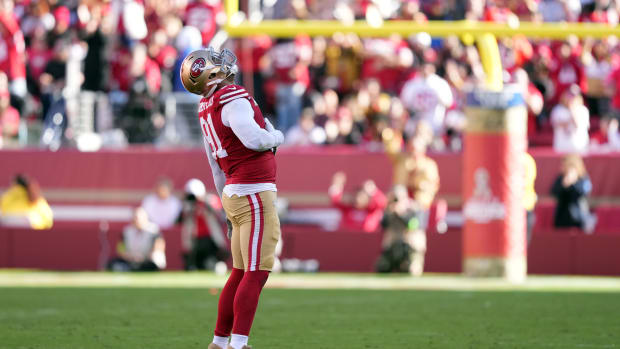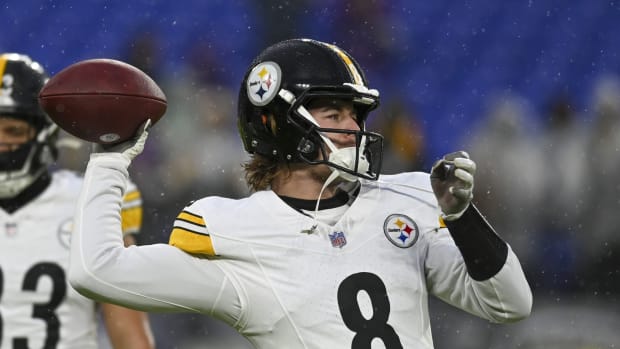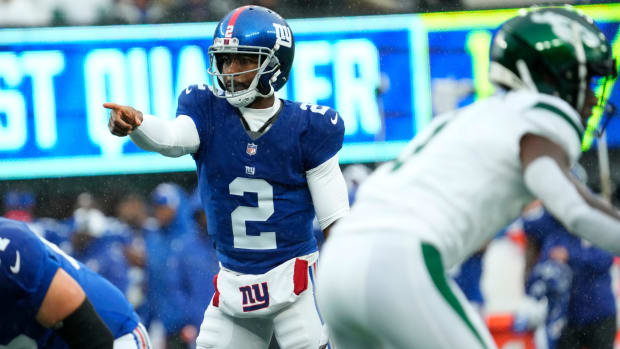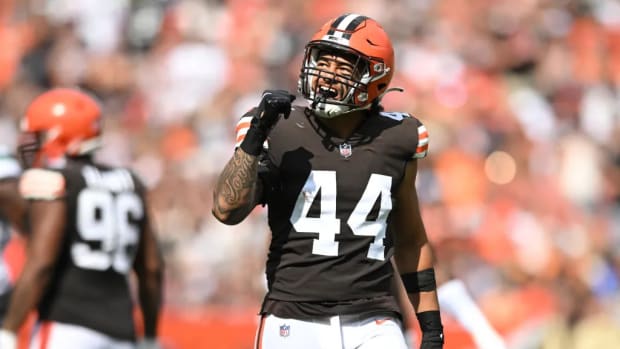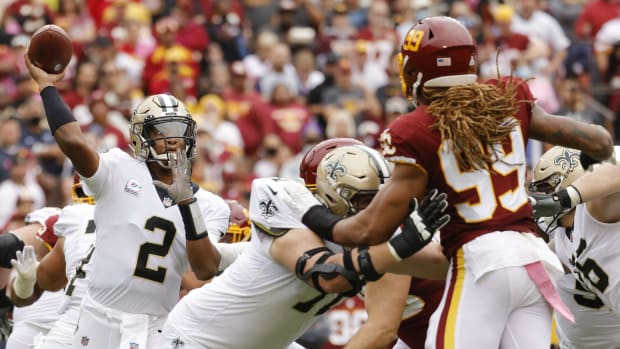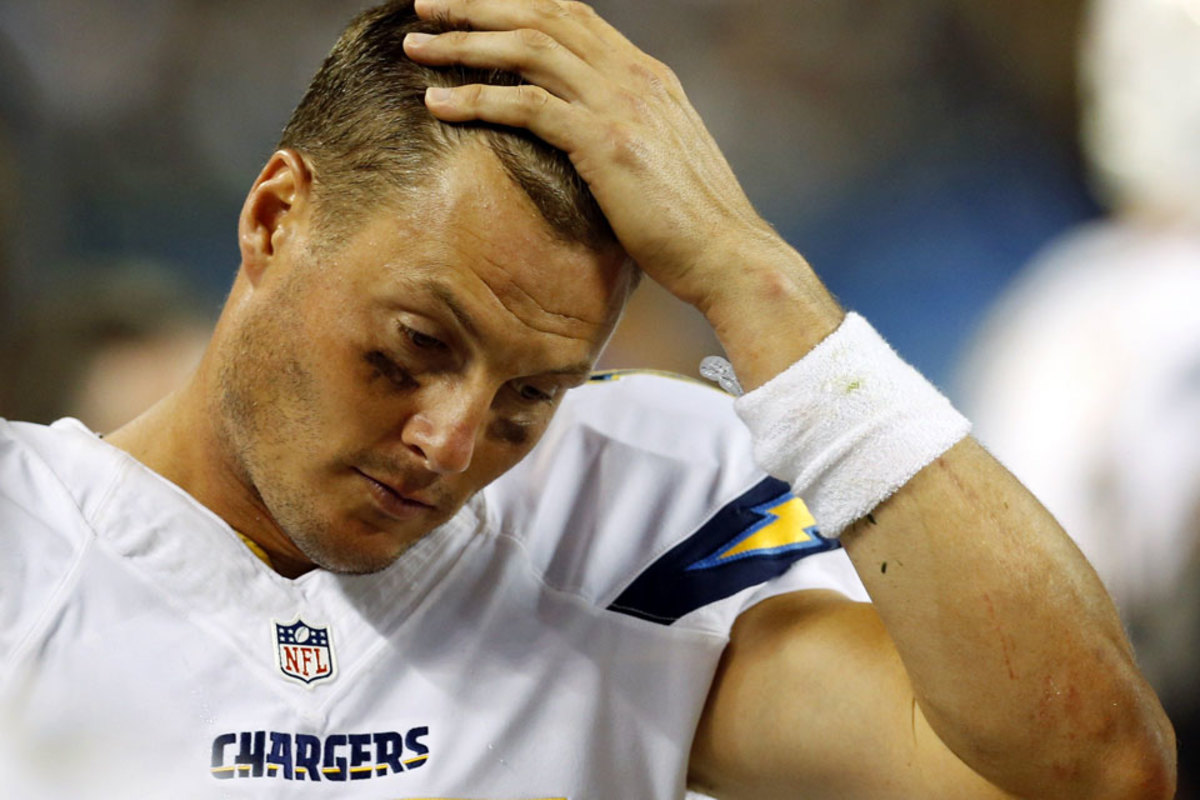
Same Old Chargers
SAN DIEGO — It was only one victory, but to Philip Rivers it meant so much more. Two Sundays ago, he stood on the sideline with his hands on his knees, a wide grin on his face and elated relief in his eyes after the Chargers drove 51 yards in the final two minutes for a 46-yard field goal to beat the Eagles on the road.
His only thought: Finally!
San Diego had lost 11 of its previous 12 games decided by seven points or fewer—think about that for a second: 11 of 12—including a 31-28 decision six days earlier in which it surrendered 24 consecutive second-half points to Houston in the season opener. If the Chargers could just convert a close loss into a narrow victory, Rivers kept telling himself, there was potential for it to snowball into something positive.
“We had been so close in all the games the year before, so there was a sense of relief. We won one of these! Everybody felt it,” Rivers said on Wednesday afternoon, standing in the soft shadows outside the Chargers’ training complex and reenacting his look—wide grin and even wider eyes—from Philadelphia. “When we won the way we did, scoring on all three possessions in the fourth quarter, putting up a touchdown right after they scored one to take the lead, driving for the winning kick, it had the feeling of—(deep sigh)—we won us a close game.”
Philip Rivers (l.) and offensive lineman Jeromey Clary were finally able to smile after the Chargers' 33-30 win over the Eagles in Week 2. But the good vibes were fleeting.
The sensation didn’t last long.
Just seven days later the Chargers were back to their old ways. They allowed the Titans to drive 94 yards in the final 2:05 for a touchdown and a 20-17 victory that was achingly painful (and all too familiar) to Chargers fans who wonder aloud why their team can’t close out games. Last year, San Diego led 24-0 at the half against visiting Denver but lost. It led Houston by 21 in the third quarter this season but lost. With 2:05 to play last Sunday, it was matched against a Tennessee squad that had no timeouts, a career 56% passer at QB and 94 yards to go for the winning score. All Jake Locker did was complete 7 of 10 passes—one incompletion was a spike to stop the clock—to account for all 94 yards, the last 34 coming on a leaping catch by rookie wideout Justin Hunter. It was Hunter’s first career reception and Locker’s only touchdown pass in the game.
“There was never a sense when that game got close in the fourth that we were going to lose,” says Rivers. “It was, We’re fixing to finish this one. Offensively that’s what we felt, and when we punted and the defense came on, they felt there’s no way they’re going 94 on us. We both had our chances, offense and defense, and didn’t get it done. But the confidence was there.”
If so, it begs a fundamental question that’s been haunting the Chargers for two-plus seasons: Why can’t they finish games? Is it mental? Physical? Cultural—meaning somehow ingrained in the organization?
“If someone had the answer to that they’d make a lot of money,” first-year general manager Tom Telesco says. "It comes down to execution in critical times, and execution is physical and mental. I don’t think it’s cultural.”
You can’t help but wonder. Despite a new season, and despite a new coaching staff and six starters who weren’t here last season, the failures of the recent past linger in the air. None more than the Ravens converting on 4th-and-29 with 1:59 to go in regulation last year. Baltimore turned the conversion into a tying field goal, then prevailed 16-13 in overtime.
The failures of recent past linger in the air. Why can’t the Chargers finish games? Is it mental? Physical? Cultural—meaning somehow ingrained in the organization?
Are the Chargers preoccupied with that play in late-game moments of crisis? No. But does it creep into their consciousness late in the fourth quarter when things aren’t going right? There was a pause from tight end Antonio Gates when asked about it.
“It’s something that happened,” he finally says. “Sometimes people like to use that as the turning point in the culture, because you see things happen and we’re still struggling to get over the hill. You watch us play and you’re like, You lost? I come home and my girl is like, Y’all lost? You can’t believe it. You say, not that game. You just take away the scoreboard and watch that game, and there’s no way Tennessee should have beaten us.”
Yet it did. Now the Chargers find themselves at an early season crossroads with the Cowboys coming to town on Sunday. They very easily could be—and probably should be—3-0 right now. Against the Texans they surrendered the winning score as time expired, and against the Titans they did so with 15 seconds to play. As much as players say there isn’t a drain on confidence, they’re only human. And when bad things happen repeatedly, it’s only human nature to look around and wonder, What gives?
The sticky issue is how to handle it. Simple question, complex answer. Harp too strongly on the need to finish—which, by extension, highlights their failures to do so—and you run the risk of guys becoming too tight or playing scared in critical situations down the stretch. Yet if you don’t talk about it enough, there’s the possibility that the urgency and gravity of the moment might be lost on someone during the week of practice.
On the Titans' final drive, Jake Locker completed 7 of 10 throws for 94 yards. One incompletion was a tipped ball that should have been an easy interception for defensive back Marcus Gilchrist (38), who dropped it with 44 seconds to play. Four plays later, Tennessee scored the go-ahead touchdown.
John Lynch can relate. He was a starting safety with the Bucs when Tony Dungy took over as coach in 1996. That year Tampa Bay finished 6-10, with seven games decided by seven points or fewer. Of those games, the Bucs lost the first five. But the pendulum swung the other way; they won two close games late in the year and carried that momentum into the next season, winning by seven points in Weeks 1 and 2 and by one in Week 5.
“Tony had a very precise defensive system that was predicated on everyone being aware of where they were supposed to be and when they were supposed to be there, otherwise it wouldn’t work,” says Lynch, now a color commentator for NFL on Fox. “It took a long time for people to trust that that would actually work. We started 1-8 that first year and it was everybody in the most pressurized moments saying, ‘I’m going to be the guy to make the play.’ Well, in an effort to do that you forgot about doing your job.
“It took us trusting Tony, trusting that system—which had been proven—to finally get to the point where you would trust your training in the most pressurized moments. Once we did that and saw that it works, then everyone was like, ‘Oh, this is what we have to do.’ Our situation in Tampa had been bad for so long that when things didn’t go right, it was kind of, here we go again. It took having some success doing it the right way to believe. That’s where I believe Tony was brilliant, the way he continued to implore to us that we’re not changing personnel. Because prior to that the answer had always been change, change, change. He said, ‘We’re going to stick with this system that works, and once you buy in you’ll see that it works. And once you start trusting the 10 other guys on the field, we’ll start winning these games that we’re losing.’ It worked.”
San Diego very easily could be, and probably should be, 3-0 right now. There isn't a sense of panic as much as there is an understanding that things must change.
There is not a sense of panic within the Chargers organization as much as there is an understanding that things must change. Whether players have enough trust in each other and the system remains to be seen. Rivers acknowledges, however, that his greatest fear is teammates trying to do too much instead of just doing their jobs—himself included.
“I know I’ve said to myself that I have to guard against (the attitude of) now we have to make a play, we have to make something happen,” he says. “It’s late in the game and we haven’t made it happen; we’ve got to make it happen. That’s when you throw an interception for touchdown. That’s when you unravel, when you think of the last two years. When it was starting to get away from us, it was like, We’ve got to score on this drive at all costs. That’s when it blows us. It’s important for us to continue to trust and believe in what we’re doing. We’re doing a lot of good. No, we’re not satisfied with how we’ve lost. But keep believing and keep trusting and we’re going to get it going.”
The last time the Cowboys journeyed to San Diego was for the 2005 season opener. Trailing by four with 3:01 to play, the Chargers drove from their 34-yard line to the Dallas 7. They had four opportunities to score from there and failed each time, falling 28-24.


































